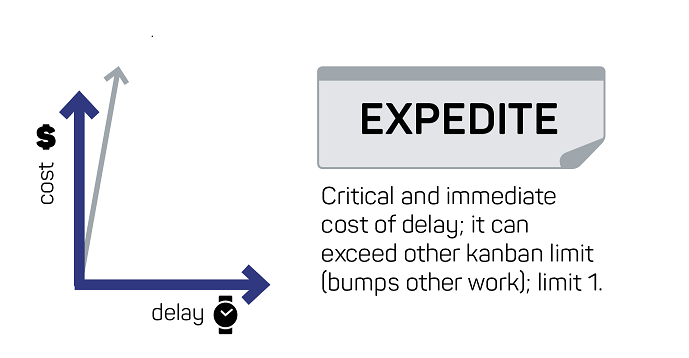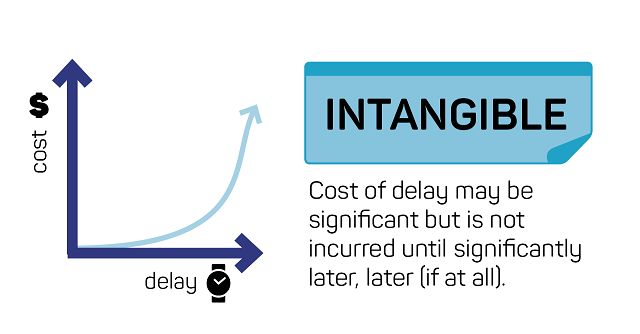Understanding what stands behind Classes of Service, even in their simplest form, gives people the Archimedes’ “eureka!” moment and opens new options for further discussion about improvements.
“I really like the way you move these colorful sticky notes through the board but, you know… we have DEADLINES here!”
“I would like to start using Kanban, but I was told you can apply it only when you have no deadlines.”
“Yeah, yeah… have fun with your board, but we have work to do here. And we are already late.”
These are real words I have heard many times from my colleagues or managers working in, what we may trivially call, business. My colleagues – my customers´ words which ignite an initial emotional reaction from me of: “No, it is not like this! Let me explain!”, brought me to realize that this can only sprout additional resistance.
When I hear “but”, the first thought I have is the quote of Benjen Stark (from “Song of Ice and Fire” saga) saying: “My brother once told me that nothing someone says before the word ‘but’ really counts.” Also, in this case, what comes before “but” is always one or another Kanban myth. What comes after are real problems people encounter every day: overburdening, overtime working, annoying interruptions and distractions, time theft. Always in a rush, always in hurry, always late. Endless firefighting instead of normal work. Irritation over satisfaction.
This is the moment, when you can help people to realize the importance and significance of a simple yet underestimated concept: Classes of Service, which can support the decision making by answering one basic question: “What will happen (in a true business sense) if you don’t finish the work item by the deadline?” Understanding what stands behind Classes of Service, even in their simplest form, gives people the Archimedes’ “eureka!” moment and opens new options for further discussion about improvements.
You are already familiar with classes of service: if you´ve ever bought a 1st class stamp, paid extra to use a specialist delivery service like UPS, paid extra for 1st class on a train, watched as the kids in ski-school get to jump the line for the chairlift, or again paid extra to jump the queues at Disneyworld, then you understand classes of service and what they mean for you as a consumer, and if you pause just a moment, what they mean in terms of extra profits for the business offering them. You will always consider paying extra for better service, when it is important enough to you! Your favorite band was playing a summer concert in a stadium nearby, did you pay extra for the VIP tickets?
Before we go further, let’s introduce some details of Classes of Service and how they are used in Kanban.
“Run, Forrest, run!” or “Expedite”
If you run a café, expedite class of service will be represented by a businessman who is late for the morning meeting and needs his coffee to go immediately.

“Expedite” class of service means that you are already late. Not just late. You are super late and the work you have just learned about was supposed to be completed yesterday. It’s “all hands on deck” request and it may happen that you are required to postpone the work you (and sometimes even the others) proceed with and focus on solving and delivering the expedite item. There are no excuses as impact of delay is immediate and usually very harmful. Examples? Defects with significant impact on production, quickly approaching regulatory deadlines. Expedite means it jumps the queue, every queue, and you will put other work on hold to make it happen immediately. And yes, all missed fixed date requests will eventually land here.
“I don’t know what to say except it’s Christmas and we are all in misery” or “Fixed Date”
In our coffee business fixed date will be group of customers, who booked their table for 11 AM and may be pretty disappointed, if they realize their table is occupied and there is no one who can help them.

When you talk to people from finance departments, you will realize that the environment they operate in is mostly fixed date (annual or monthly reporting, daily deadlines for payments etc.). When you think about marketing, supply chain, stores, online shops… Most of them is dependent on annual events cycle. “Fixed date” class of service is their bread and butter. Fixed date means that you need to meet the deadline. When missed, impact of delay is immediate. Christmas has its fixed date every year, Olympics every four years. You need to plan accordingly, otherwise… welcome expedite!
“Just keep swimming!” or “Standard”
“Standard” class of service means regular work items, which are sequenced based on FIFO (first in, first out) queuing method or related to it “always pull the oldest available ticket” rule. Urgency of these items is increasing and accelerating before levelling off at some later point when most of the value is gone.

Standard class of service in our café is a regular client, who stopped to drink a coffee, read newspaper and is not in rush, but also expects to be serviced in reasonable timeframe. If we keep them waiting too long, tomorrow they will read their paper in a different café.
“After all, tomorrow is another day!” or “Intangible”
Did you hear about very special and unique coffee type, which is available for special order but one of your loyal customers would really love to try it?

“Intangible” is the tricky one, the black sheep in the Classes of Service family. Nice to have. Not particularly urgent. Finishing this work would probably help. Everyone knows that intangible items should be done one day. But there is ALWAYS something more urgent: fixed date, expedites, even standard tickets. Intangible may remain forgotten for a long time, and some of them have tendency to turn into fixed date or even expedite items. Technical debt? Checked. Nice-to-have improvements? Checked. Financial application upgrade required in two years? Checked. If you see any of them, just be careful and include them in your plans.
Intangible (cost of delay) class of service items, are generally the type of background projects that you like to do when you have some small respite from the chaos, of expedite and fixed date work. When rush hour is over, and you can take a breath, perhaps we spend time in our café redecorating for the new season: changing out the flowers, and the Objet d’Art.
Classes of service may become your best friend, when it comes to making planning decisions and organizing your priorities. Applying classes of service brings more flexibility to you and your customers while optimizing the economic outcome and managing the risk. If you want to learn how to use classes of service most effectively, check out our Triage Tables poster. Use it at your Kanban replenishment meeting. It´s available to download or if you prefer to a calculator in the palm of your hand, try our Mauvisoft Menta Triage Decision Support application. Maximize your business value, and your economic outcomes: make decisions with confidence. By understand the true urgency of the work you do, bring back some sanity to your workplace.
If you like this lesson and would like to know more about Classes of Service, then we teach this as part of the Kanban Management Professional training path. Check our listing for forthcoming classes.
*mid-titles come from: “Forrest Gump”, “Christmas Vacation”, “Finding Nemo” and “Gone with the wind”



